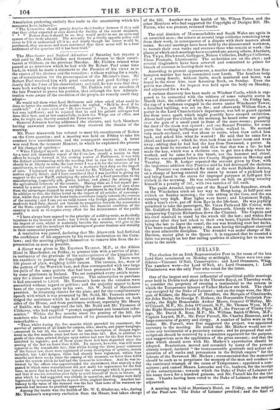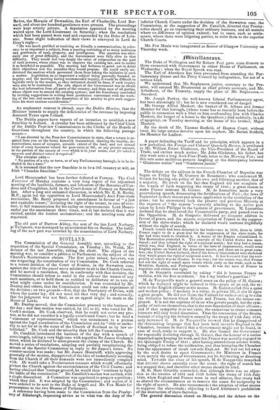IRELAND.
The election for an Irish Representative Peer in the room of the late Lord Gott terminated on Monday at midnight. There were two can- didates—Viscount O'Neil, Conservative ; and Lord Oranmore, Whig. The numbers were—for Lord O'Neil, 46; Lord Oranmore, 1. Lord Trimlestown was the only Peer who voted for the latter.
One of the largest and most influential of unpolitical public meetings ever held in Dublin took place in the Theatre Royal, on Thursday week, to consider the propriety of erecting a testimonial to the esteem in which the Temperance labours of Father Mathew are held. The chair was occupied by the Duke of Leinster ; and on the stage were, the Mar- quis of Kildare, the Marquis of Headfort, the Marquis of Clanricarde, Sir John Burke, Sir George F. Hodson, the Honourable Frederick Pon- sonby, the Right Honourable Arthur Moore, General O'Malley, Mr. O'Connell, M.P., Mr. John O'Connell, M.P., Mr. Thomas Wyse, M.P., the Right Honourable David R. Pigot, M.P., the Provost of Trinity Col- lege, Mr. David R. Ross, M.P., Mr. William Smith O'Brien, M.P., Captain Layard, M.P., Mr. Peter Purcell, Mr. Charles Bianconi, and a large concourse of gentry and clergy. A number of ladies were in the boxes. Mr. Purcell, who first suggested the project, was appointed secretary to the meeting. He stated that Mr. Mathew would not re- ceive any testimonial of a pecuniary nature ; and he proposed that sub- scriptions should be received by a committee appointed for the purpose, and suggestions as to the application of the gross amount ; and that the plan which should meet with Mr. Mathew's approbation should be adopted. Resolutions, moved and seconded by many of the persons already named, declared "the irnmeasureable gratitude and ardent ad- miration of all ranks and persuasions in the British empire" for the labours of the Reverend Mr. Mathew ; recommended that the memorial should be such as to perpetuate the memory of the man and conduce to the continued triumph of the cause of Temperance ; appointed a com- mitteee ; and named Messrs. Latouche and Co., bankers, for the receipt of the subscriptions ; towards which the Duke of Duke of Leinster set his name down for a hundred guineas, and Mr. Purcell his for the like sum. Thanks having been voted to the Duke of Leinster, the meeting adjourned
A meeting was held at Morrison's Hotel, on Friday, on the subject of the Poor-law. The Duke of Leinster presided ; and the Earl of
Roden, the Marquis of Downshire, the Earl of Charleville, Lord Ber- nard, and about one hundred gentlemen were present. The proceedings were kept strictly private. A deputation appointed by the meeting waited upon the Lord-Lieutenant on Saturday ; when the resolutions which had been passed were read and expounded by the Duke of Lein- ster. Some slight iedication of their views is conveyed in Lord de Grey's reply— "He was much gratified at receiving so friendly a communication, in refer- ence to so important a subject, from a meeting consisting of so many noblemen and gentlemen of rank, property, and intelligence. The question was obvi- ously one of great difficulty, and the Government were fully alive to that difficulty. They would feel very deeply the value of cooperation on the part of such persons, whose object was to improve the existing law, and to render it as beneficial as posssible. The meeting had forborne to point out in detail their objections and the remedies they would propose. He could easily un- derstand the motives which prevented them from taking the initiative in such a matter. Legislation on so important a subject being generally founded on inquiry, and the meeting having recommended inquiry, it would be difficult to legislate early in the session, as they intimated should be done, if such inquiry were also to be instituted. The sole object of the Government was to obtain the best information from all parts of the country, and from men of all parties, whose object was to amend the existing system; and his Excellency concluded by inviting suggestions in writing from gentlemen conversant with the work- ing of the law, and assured the deputation of his anxiety to give such sugges- tions his most anxious consideration."
An unpleasant rumour is abroad, says the Dublin Monitor, that the Minister intends to supply the deficiencies of the revenue by imposing Assessed Taxes upon Ireland.
The Dublin papers have reports of an intention to establish a new franchise in Ireland. A circular has been addressed by the Chief Clerk of the Dublin Poor-law Commissioners to the Clerks of the Boards of Guardians throughout the country, in which the following passage occurs- " I am directed by the Poor-law Commissioners to state, that a return is re- quired from you on the forms herewith transmitted, showing the locality, de- nominations, name of occupier, acreable extent of the land, and net annual value of every tenement valued for poor-rates at 301., or any greater amount, in the portion of the county of — which is in your union, and for which a separate and distinct return is required."
The circular adds- . No portion of a city or town, or of any Parliamentary borough, is to be in- cluded in the return."
It is assumed that the new franchise is to be a 30/. tenancy at will, an Irish " Chandos franchise."
Lord Mounteashel has been further defeated at Fermoy. The Cork Examiner of Monday contains a very long report of the adjourned meeting of the landlords, farmers, and labourers of the Baronies of Con. dons and Clongibbon, held in the Court-house of Fermoy on Saturday last. After a long and animated discussion, in which Mr. E. B. Roche, N.. P., again led the opposition to Lord Mountcashel's Anti Free-trade resolutions, Mr. Barry proposed an amendment in favour of "a just and equitable tenure," declaring the right of the tenant, in case of evic- tion, to full remuneration for his outlay on improvements. Lord Mount- cashel put the amendment three times, and at last declared that it was carried, amidst the loudest acclamations ; and the meeting soon after separated.
The old part of Darrow Abbey, the seat of the late Lord Norbury, at Tultamore, was destroyed by an accidental fire on Sunday. The build- ing of the new part was arrested by the assassination of Lord Norbury.



























 Previous page
Previous page